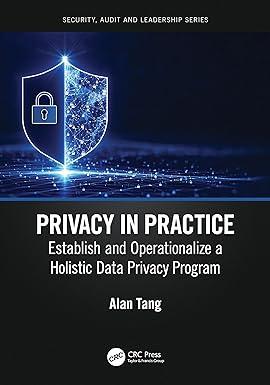Question
CASE STUDY Read: Cases from the Real World , page 222. (Access free at https://openstax.org/books/business-ethics/pages/7-5-criticism-of-the-company-and-whistleblowing)Links to an external site. Sherron Watkins and Enron Enron is
CASE STUDY
Read: Cases from the Real World, page 222. (Access free at https://openstax.org/books/business-ethics/pages/7-5-criticism-of-the-company-and-whistleblowing)Links to an external site.
Sherron Watkins and Enron
Enron is one of the most infamous examples of corporate fraud in U.S. history. The scandal that destroyed the company resulted in approximately $60 billion in lost shareholder value. Sherron Watkins, an officer of the company, discovered the fraud and first went to her boss and mentor, founder and chairperson Ken Lay, to report the suspected accounting and financial irregularities. She was ignored more than once and eventually went to the press with her story. Because she did not go directly to the SEC, Watkins received no whistleblower protection. (The Sarbanes-Oxley Act was not passed until after the Enron scandal. In fact, it was Watkinss circumstance and Enrons misdeeds that helped convince Congress to pass the law.40Links to an external site.)
Now a respected national speaker on the topic of ethics and employees responsibility, Watkins talks about how an employee should handle such situations. When youre faced with something that really matters, if youre silent, youre starting on the wrong path . . . go against the crowd if need be, she said in a speech to the National Character and Leadership Symposium, (a seminar to instill leadership and moral qualities in young men and women).
Watkins talks openly about the risk of being an honest employee, something employees should consider when evaluating what they owe their company, the public, and themselves. I will never have a job in corporate America again. The minute you speak truth to power and youre not heard, your career is never the same again.
Enrons corporate leaders dealt with the looming crisis by a combination of blaming others and leaving their employees to fend for themselves. According to Watkins, Within two weeks of me finding this fraud, [Enron president] Jeff Skilling quit. We did feel like we were on a battleship, and things were not going well, and the captain had just taken a helicopter home. The fall of 2001 was just the bleakest time in my life, because everything I thought was secure was no longer secure.
Supplemental Readings
- Enron Chiefs Guilty of Fraud and ConspiracyLinks to an external site. (The New York Times, May 25, 2006)
- Behind the Enron ScandalLinks to an external site. (TIME magazine, 2016)
- The Enron Ponzi SchemeLinks to an external site. (The Atlantic, March 2002)
Reflection Questions
- What would you have done if you were in Sherrons position?
- What factors would contribute to your decision?
- How would you weigh the consequences of your decision?
- What effect would your decision have on key stakeholders (Enron managers, investors, customers, and your coworkers)?
Critical Thinking
- Did Watkins owe an ethical duty to Enron, to its shareholders, or to the investing public to go public with her suspicions? Explain your answer.
- How big a price is it fair to ask a whistleblowing employee to pay?
DIRECTIONS
Instructions for all case studies:
Prepare a paper that is longer than one full page.
At a minimum discuss:
- The particulars of the case
- The critical issues
- The applicable points from the readings that apply
- Personal experience with similar issues
- Questions brought up in the exercises, and
- How you believe most people would act in a similar circumstance.
Step by Step Solution
There are 3 Steps involved in it
Step: 1

Get Instant Access to Expert-Tailored Solutions
See step-by-step solutions with expert insights and AI powered tools for academic success
Step: 2

Step: 3

Ace Your Homework with AI
Get the answers you need in no time with our AI-driven, step-by-step assistance
Get Started


